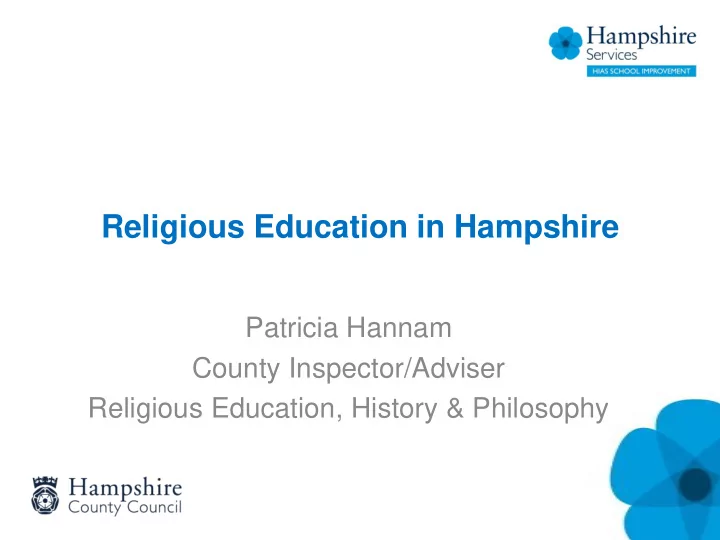

Religious Education in Hampshire Patricia Hannam County Inspector/Adviser Religious Education, History & Philosophy
Context: The unique history of religious education in English maintained schools • 1870 Education Act • Elementary schools for all • Accommodation with the churches • Religious education for all • Not Distinctive of any denomination. • Nothing much changed until.. • 1944 Education Act • RE Compulsory • Position strengthened in Education Acts of 1988 and 1996 • No legislative change since then
Context: The role and responsibility of the LA Each LA must: • establish a permanent body called a standing advisory council on religious education (SACRE) to advise the LA on Religious Education and monitoring the effectiveness of its agreed syllabus. LAs must appoint representatives to each of four SACRE committees, representing respectively : o Group A: Christian denominations and such other religions and religious denominations as, in the authority’s opinion, will appropriately reflect the principal religious traditions in the area o Group B: the Church of England o Group C: teacher associations o Group D: the LA • establish an occasional body called an agreed syllabus conference (ASC) to review the agreed syllabus for RE adopted by the LA.
Hampshire Agreed Syllabus Living Difference III The status of religious education within the whole school curriculum Section 352 of the Education Act 1996 identifies the distinctive place of religious education as part of the basic curriculum alongside the National Curriculum. Religious education is to have equal standing in relation to the core and foundation subjects within the school. It differs from the subjects of the National Curriculum only in that it is not subject to national prescription. It is a matter for the Agreed Syllabus Conferences to recommend locally prescribed procedures for the local authority (LA). The Education Act 1996, School Standards and Framework Act 1998 and Education Act 2002 require that: religious education should be taught to all children and young people other than those in nursery classes and except for those withdrawn at the wish of their parents. Teachers’ rights are safeguarded, should they wish to withdraw from the teaching of religious education religious education in all community, foundation and voluntary controlled schools should be taught in accordance with an Agreed Syllabus an Agreed Syllabus should reflect the fact that the religious traditions in Great Britain are in the main Christian, while taking account of the teachings and practices of the other principal religions in Great Britain Religious Education must be taught in all maintained schools from Year R. LA schools MUST use the Agreed Syllabus: Living Difference III In Academies RE is written into their funding agreement and they can use the Agreed Syllabus should they wish.
Religious Education in Hampshire : headlines I Hampshire Standing Advisory Council on Religious Education (SACRE) effective and well attended. Always Chaired by County Councillor. A monitoring Group meet a month before each full SACRE meeting, examines Ofsted Reports and other data. Undertakes monitoring visits to both primary and secondary schools. These visits reveal that RE thrives where support from the senior leadership team for RE is strong.
Religious Education in Hampshire : headlines II Hampshire maintains a good reputation locally, regionally and nationally for high quality RE. The innovative approach in Living Difference III, enriched by the skills of philosophical and theological enquiry, has not only been gathering interest from other local authorities, but through the partnership in academic research also coming to international attention. For example project about to commence with Brunel University London, into religious literacy which will have impact for Hampshire teachers.
Religious Education in Hampshire : headlines III A particularly significant strength of RE in Hampshire continues to be the level of support offered to senior leadership teams and teachers of RE in primary and secondary schools through the inspection and advisory service (HIAS). SACRE monitoring visits to both primary and secondary schools continue to show that RE thrives where support from the senior leadership team for RE is strong. A programme of continuing professional education for teachers is available and well attended. RE in Hampshire in primary schools and at KS3 is in general compliant with the law and well taught
Key Stage 4 • All young people should have access to High Quality Religious Education • Schools meet this requirement in a number of ways – including enabling all young people access Full Course GCSE in less time than recommended by exam boards. • Some don’t meet the requirement • SACRE through the monitoring group seeks to address situations where RE is not taught to all young people.
GCSE – KS4 Data to 2016
Religious Education in Hampshire : headlines IV • Hampshire SACRE has continued, in this reporting period, to support a Youth Voice to SACRE enabling young people’s views on their RE to be heard. Meets once each term in Winchester – regional representation. • Hampshire Youth Voice to SACRE plans an annual conference – this year on July 9 th . “Religion: Provider of Peace or Causer of Conflict?” • SACRE Primary Youth Voice Conference
Recommend
More recommend